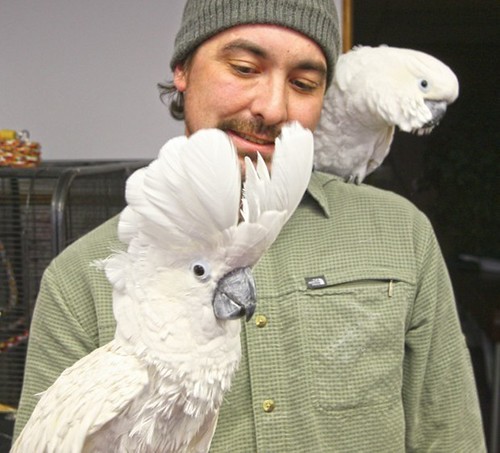 Ryan Trevithick holds a pair of cockatoos that have adjusted to their life at the sanctuary. Some of these exotic birds can live as long as 60 to 80 years. WALTER HINICK/Montana Standard BUTTE — A scream emanating from a second floor window on West Broadway Street one afternoon stunned a passer-by.
Ryan Trevithick holds a pair of cockatoos that have adjusted to their life at the sanctuary. Some of these exotic birds can live as long as 60 to 80 years. WALTER HINICK/Montana Standard BUTTE — A scream emanating from a second floor window on West Broadway Street one afternoon stunned a passer-by.
“Help me! Help me!” the voice cried. The shocked pedestrian thought someone was trapped.
Lori McAlexander laughs when she recounts that story. No one was trapped. It was just one of her exotic birds crying wolf.
The irony is that the bird screaming for “help” already was rescued, along with many other birds. McAlexander operates Montana’s Parrot and Exotic Bird Sanctuary out of that location at 55 W. Broadway St. in Uptown Butte.
She has an affinity for the fine-feathered friends.
“I’ve always like birds. I’ve always been a birdbrain,” she says.
McAlexander and her husband, Branch, have run the sanctuary for the past eight years. They provide a haven for about a dozen birds, which include cockatoos, an African gray and macaws.
“We get birds from all over,” McAlexander said.
Being the only exotic-bird sanctuary in the region, McAlexander says they’ve taken in unwanted or orphaned birds from as far away as New Hampshire to Los Angeles. She rehabilitates them, and then makes them available for adoption. In its eight years of operation, homes have been found for more than 600 birds, she said.
Life at the studio loft sanctuary is, if anything, noisy.
Ryan Trevithick, a volunteer, says a cockatoo’s scream can get as loud as 120 decibels. (A gunshot or firecracker is 140 decibels.)
“You can sometimes hear them down on Main Street,” Trevithick said.
Noise is just one of the many reasons some people can’t handle exotic birds as pets. That’s why McAlexander says it’s important to have a sanctuary.
She said people tend to buy exotic birds on impulse and aren’t prepared to handle them.
“They think they are like cats and dogs, but they’re not,” she said. “They are very complicated and very social. If you think about it, they live in flocks.”
She said the biggest mistake bird owners make is not giving these social birds enough attention. They can easily become stressed and squawk loudly, become aggressive and damage property. She says stressed exotic birds also start “plucking,” which is when they start pulling out their own feathers.
Not everyone can handle exotic birds, which can live as long as 60 to 80 years.
McAlexander knows bird owners whose wills mandate that their pets be turned over to the sanctuary when the owner dies.
She recalls taking in an African gray that once belonged to actor Val Kilmer.
“I never got to met him, but I did talk to him on the phone,” she said, adding that the bird was eventually adopted.
A most recent acquisition is a cockatiel, which was rescued outside the Butte courthouse last month. Courthouse employees turned it over to the sanctuary, and it has yet to be claimed.
Some birds get to the Butte sanctuary in other ways.
Chi Chi, a Mexican red-headed parrot, belonged to a biker gang in New Hampshire. After police raided the gang’s home, the bird was left orphaned, so authorities turned it over to McAlexander.
Chi Chi came with biker baggage, to say the least.
“He had some really colorful language when we first got him,” she said.